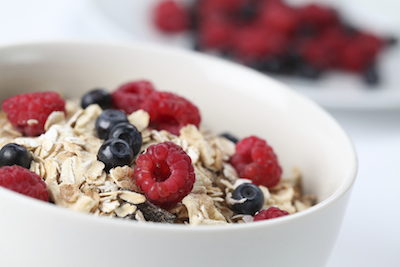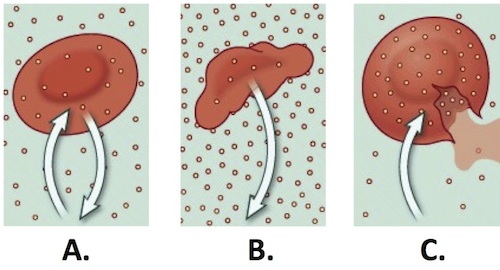
Chapter 3. Osmosis Happens
Osmosis Happens

Read the article below. Then answer the questions that follow.
Osmosis and your intestines

No one likes dealing with diarrhea or constipation. A good way to avoid these intestinal problems is to get enough dietary fiber in your diet by eating raw fruits and raw or lightly-steamed vegetables. But in reality, the average American diet includes a lot of meat and refined carbohydrates, which don’t move through the system as easily. In addition to diet, infection is another major cause of intestinal problems.
Whatever the cause, you might be surprised to learn that water absorption in the intestinal track—the root of both diarrhea and constipation—involves osmosis (the tendency of water to move across a semi-permeable membrane, like that which encloses human cells, towards a higher solute concentration).
Understanding the interplay between osmosis and intestinal physiology might help you decide which over-the-counter treatments—if any—to purchase.
Diarrhea causes and treatments
Diarrhea is the result of too much liquid in the large intestine (also called the colon). You can get this from eating greasy foods, but it’s more commonly associated with bacterial, viral, or protozoan infections. It may also be caused by a reaction to various chemicals and medications. Diarrhea can lead to dehydration, and can be a very serious problem in infants and young children.
Some of the leading over-the-counter diarrhea medications contain an active ingredient called loperamide, which acts on opioid receptors found in the muscles lining the walls of the intestines. By acting on these receptors, loperamide reduces the muscular contractions of the intestine (called peristalsis). This reduces the speed at which food and fecal matter move through the gut.
This is where osmosis and gut physiology begin to work together. When the intestines push things more slowly through the body, there is more time for water to be reabsorbed by the process of osmosis. Since the waste matter in the gut is watery, it’s not very concentrated. When it contacts the cells that line the gut, the water flows across the semi-permeable cell membrane, towards the more concentrated solute levels inside the cell.

Other products people take contain bismuth subsalicylate, a derivative of salicylic acid (the active ingredient in aspirin).
This works as a mild anti-inflammatory agent. By calming inflammation in the digestive tract, waste material can move more slowly through the gut. Much like loperamide, this allows more time for water to be reabsorbed by osmosis.
What happens when there is too little water?
The direct cause of constipation is the opposite of that of diarrhea: too little water in the colon. This can happen due to dehydration, or because foods with little water and fiber content are eaten. When waste products in the body become too concentrated, they move more slowly through the gut.
There are many types of products (generally called laxatives) available for treating constipation. Some laxatives, such as Metamucil, work by adding large amounts of fiber in the digestive tract. Since fiber is hydrophilic—or water attracting—it helps hold water in the colon, and keeps it from getting absorbed.
Other laxatives add salt to your digestive tract, such as sodium phosphate, magnesium citrate, magnesium hydroxide (including “Milk of Magnesia”), and magnesium sulfate (“Epsom salt”). These salts are slowly absorbed and reach the colon largely intact. Here they create a hypertonic environment—i.e. they are more concentrated than the solution inside the neighboring cells, which line the gut. Water moves out of the intestinal tissue and into your colon by osmosis. This relieves constipation.
Medication or just “tough it out”
Used responsibly, these products can provide relief, but overusing them—which occurs more often than you might think—can be harmful to your health. Taking too many laxatives can cause diarrhea, and drying up your gut can lead to constipation. When faced with simple diarrhea or constipation, many people choose to forgo over-the-counter meds and just let nature take its course. Whatever choices you make about medication, a healthy diet should be a part of your approach.
Fiber & Your Diet
Fiber does more than stave off constipation (and cause diarrhea if you get too much). Its benefits include reducing the body’s ability to absorb cholesterol and helping to flush out potential harmful substances in your intestines—which is why it reduces the risk of colon cancer.
The best food sources of fiber include beans, peas, bran cereal, figs, apricots, berries, sweet corn, whole-grain cereal products, broccoli, potato skins, plums, pears, apples, raisins, spinach, and nuts.
Experts recommend including produce in every meal—and in eating it first because the fiber will fill you up. They also recommend making fruits and vegetables your in-between meal snacks as a way to get more fiber into your diet.
© 2015 WH Freeman and Company.
3.1 Comprehension Questions
Answer the following questions to demonstrate your understanding of the article.
1.
Diarrhea is caused by in the colon, whereas constipation is caused by .
2.
Fill in the Blank:
A common active ingredient found diarrhea medication is loperamide, which reduces the rate of intestinal wall muscular contractions. This rhythmic contraction of the intestinal wall is called .
3.
How does decreasing the rate of intestinal contractions effectively relieve the symptoms of diarrhea?
| A. |
| B. |
| C. |
| D. |
| E. |
4.
True/False:
Diarrhea is a common disease that afflicts million of people of all ages around the world. But, fortunately, it is only a nuisance and does not cause serious illness or death.
5.
The process of osmosis results in the movement of water through a semi-permeable membrane to areas of solute concentration.
6.
Why do some laxatives contain fiber?
| A. |
| B. |
| C. |
| D. |
| E. |
7.
Some laxatives, like Milk of Magnesia, contain salts. Compared to fiber laxatives, how do these remedies work to relieve symptoms of constipation?
| A. |
| B. |
| C. |
| D. |
| E. |
8.
Eating a fiber-rich diet filled with fruits and vegetables has which of the following health benefits? Check ALL that apply.
helps reduce body’s ability to absorb cholesterol
helps lower the amount of water in the colon, preventing constipation
raises the body’s overall cholesterol levels
helps reduce risk of colon cancer
helps hold water in the colon, preventing constipation
9.
Why can drinking too little water throughout the day lead to constipation?
| A. |
| B. |
| C. |
| D. |
| E. |
10.

Tonicity refers to the measure of the concentration of solutes outside a cell relative to that inside the cell. Here, we see an animal cell (specifically, a human red blood cell) immersed in various solutions. Determine the tonicity (hypotonic, hypertonic, or isotonic) and then select the correct description for each.
A. The tonicity of "A" is . The best definition for this is .
B. The tonicity of "B" is . The best definition for this is .
C. The tonicity of "C" is . The best definition for this is .
Activity results are being submitted...